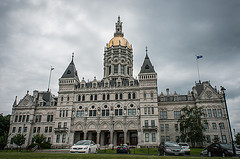A Response to Sandy Hook: Privacy Trumps Transparency in New Connecticut Bill
Citizen Media Law Project 2013-06-11
Summary:
 At a time when citizens increasingly call for government transparency, the Connecticut legislature recently passed a bill to withhold graphic information depicting homicides from the public in response to records from last December's devastation at Sandy Hook Elementary School. Though secret discussions drafting this bill reportedly date back to at least early April, the bill did not become public knowledge until an email was leaked to the Hartford Courant on May 21, 2013.The initial draft of what became Senate Bill 1149 offered wide protection specifically for families of victims of the December 14 shootings, preventing disclosure of public photographs, videos, 911 audio recordings, death certificates, and more.
At a time when citizens increasingly call for government transparency, the Connecticut legislature recently passed a bill to withhold graphic information depicting homicides from the public in response to records from last December's devastation at Sandy Hook Elementary School. Though secret discussions drafting this bill reportedly date back to at least early April, the bill did not become public knowledge until an email was leaked to the Hartford Courant on May 21, 2013.The initial draft of what became Senate Bill 1149 offered wide protection specifically for families of victims of the December 14 shootings, preventing disclosure of public photographs, videos, 911 audio recordings, death certificates, and more.
Since then, there has been a whirlwind of activity in Connecticut. After a Fox reporter brought to the attention of Newtown families a blog post by Michael Moore suggesting the gruesome photos should be released, parents of children lost in the terrible shooting banded together to write a petition to "keep Sandy Hook crime scene information private." The petition, which received over 100,000 signatures in a matter of days, aimed to "urge the Connecticut legislature to pass a law that would keep sensitive information, including photos and audio, about this tragic day private and out of the hands of people who'd like to misuse it for political gain." As this petition was clearly concerned about exploitation by Moore and others, Moore later clarified his position, emphasizing that the photos should not be released without the parents' permission. Rather, he spoke about the potential significance of these photos if used voluntarily to resolve the gun control debate, in the same manner that Emmet Till's mother releasing a photo of her son killed by the KKK influenced the Civil Rights movement.
Like the petitioners, members of the Connecticut legislature responded with overwhelming support for SB 1149. Working into the early hours of June 4, the last day of the legislative session, the state Senate and House approved the bill 33-2 and 130-2, respectively. The bill as approved exempts photographs, film, video, digital or other images depicting a homicide victim from being part of the public record "to the extent that such record could reasonably be expected to constitute an unwarranted invasion of the personal privacy of the victim or the victim's surviving family members." The bill particularly protects child victims, exempting from disclosure the names of victims and witnesses under 18 years old. It would also limit disclosure of audio records of emergency and other law enforcement calls as public records, such that portions describing the homicide victim's condition would not have to be released, though this provision will be reevaluated by a 17-member task force by May 2014.
Though more limited in scope than the original draft with respect of the types of materials that may not be disclosed, this final bill addresses all homicides committed in the state, not only the massacre in Newtown. It was signed by Governor Dannel Malloy within twelve hours of the legislature's vote and took effect immediately.
From the beginning, this topic has raised concerns with respect to Connecticut's Freedom of Information Act and government transparency. In addition to being drafted in secrecy, the bill was not subjected to the traditional public hearing process. All four representatives who voted against SB 1149 raised these democratic concerns, challenging the process and scope of this FOI exemption. This blogger agrees that in its rush to appropriately protect the grieving families of Newtown before the session ended, Connecticut's legislature went too far in promoting privacy over public access to records,namely with respect to the broad ext
Link:
http://feedproxy.google.com/~r/CitizenMediaLawProject/~3/kY1bTJIAt5A/response-sandy-hook-privacy-trumps-transparency-new-connecticut-billUpdated:
06/11/2013, 10:27From feeds:
Fair Use Tracker » Current Berkman People and ProjectsBerkman Center Community - Test » Citizen Media Law Project